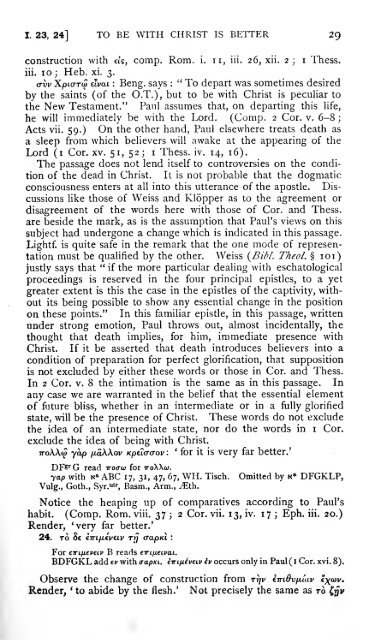Philippians and Philemon - MR Vincent - 1906.pdf
Philippians and Philemon - MR Vincent - 1906.pdf
Philippians and Philemon - MR Vincent - 1906.pdf
Create successful ePaper yourself
Turn your PDF publications into a flip-book with our unique Google optimized e-Paper software.
I. 23, 24] TO BE WITH CHRIST IS BETTER 29<br />
construction with eis, comp. Rom. i. 11, iii. 26, xii. 2; i Thess.<br />
iii. 10 ; Heb. xi. 3.<br />
eivai : Beng. says : " To depart was sometimes desired<br />
by the saints (of the O.T.), but to be with Christ is pecuHar to<br />
the New Testament." Paul assumes that, on departing this Hfe,<br />
he will immediately be with the Lord. (Comp. 2 Cor. v. 6-8 ;<br />
Acts vii. 59.) On the other h<strong>and</strong>, Paul elsewhere treats death as<br />
a sleep from which believers will awake at the appearing of the<br />
Lord (i Cor. xv. 51, 52; i Thess. iv. 14, 16).<br />
The passage does not lend itself to controversies on the condition<br />
of the dead in Christ. It is not probable that the dogmatic<br />
consciousness enters at all into this utterance of the apostle. Discussions<br />
hke those of Weiss <strong>and</strong> Klopper as to the agreement or<br />
disagreement of the words here with those of Cor. <strong>and</strong> Thess.<br />
are beside the mark, as is the assumption that Paul's views on this<br />
subject had undergone a change which is indicated in this passage.<br />
Lightf is quite safe in the remark that the one mode of representation<br />
must be qualified by the other. Weiss (^Bibl. Theol. § loi)<br />
justly says that " if the more particular dealing with eschatological<br />
proceedings is reserved in the four principal epistles, to a yet<br />
greater extent is this the case in the epistles of the captivity, without<br />
its being possible to show any essential change in the position<br />
on these points." In this familiar epistle, in this passage, written<br />
under strong emotion, Paul throws out, almost incidentally, the<br />
thought that death implies, for him, immediate presence with<br />
Christ. If it be asserted that death introduces behevers into a<br />
condition of preparation for perfect glorification, that supposition<br />
is not excluded by either these words or those in Cor. <strong>and</strong> Thess.<br />
In 2 Cor. V. 8 the intimation is the same as in this passage. In<br />
any case we are warranted in the belief that the essential element<br />
of future bhss, whether in an intermediate or in a fully glorified<br />
state, will be the presence of Christ. These words do not exclude<br />
the idea of an intermediate state, nor do the words in i Cor.<br />
exclude the idea of being with Christ.<br />
'<br />
: for it is very far better.'<br />
DFB'' G read for.<br />
yap with N» ABC 17, 31, 47, 67, WH. Tisch. Omitted by H* DFGKLP,<br />
Vulg., Goth., Syr.u'f, Basm., Arm., ^th.<br />
Notice the heaping up of comparatives according to Paul's<br />
habit. (Comp. Rom. viii. 37 ; 2 Cor. vii. 13, iv. 17 ; Eph, iii. 20.)<br />
Render, 'very far better.'<br />
24. TO eTTt/Lievetv rrj ;<br />
For reads.<br />
BDFGKL add ev with. iv occurs only in Paul ( i Cor. xvi. 8).<br />
Observe the change of construction from .<br />
Render, ' to abide by the flesh.' Not precisely the same as to -^





